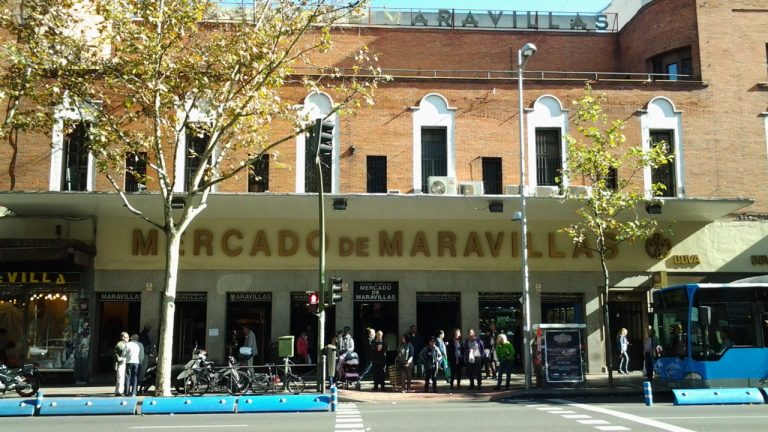
My Preferred Market, says Trustee and Performance Artist Alicia Rios, is Madrid’s Mercado de Maravillas:
Of all the lively and wonderful markets existing in Spain, I prefer the nearest to home, the Mercado de Maravillas in the Barrio de Tetuan in Madrid. You’ll find it in Bravo Murillo Street close to the Alvarado metro station.
The façade is a post-deco rationalist building of modest architectural interest whose physical dynamics work to perfection. I like this market because it is a survivor, resistant to current tendencies to modernize municipal markets and convert them into capitalist commercial areas devoted to social rather practical purpose. In Madrid, very old and classic municipal markets such as the Mercado de San Miguel and Mercado de San Anton have now metamorphosed into boutique markets invaded by over-designed boutiques catering to the demands of international foodies. As an ad-hoc market, Mercado de Maravillas offers pure seasonality and is remarkably flexible in its ability to adapt to the economic ups-and-downs of its loyal customers.
What I value most, however, is the way that the origin of the products is specified and highlighted. Spain being an agrarian country, local food-identities remain of great importance and are expressed in methods of cooking and eating both at home and at all levels of public eating. Municipal marketplaces such as the Mercado de las Maravillas bring idiosyncratic foodstuffs to the city from remote hamlets and villages, satisfying nostalgia and guaranteeing authenticity. The result is that the interior of the market looks like a 3D detailed gastronomic map of Spain.
Infectious enthusiasm is what you will find in the Mercado de las Maravillas. Staff, vendors and clients interact with happiness andaffection. Whether the enterprise is great or small, treatment of the customer is personalized. Vendors get to know their customers individual or family gastronomic profile so that, at first sight, the vendors know the circumstance of your child being ill, will remember this and say ‘I have a sliver of breast of barnyard chicken for your little Eduardo, which will make him feel much better.’ And then again, a similar suggestion would be made for the old folk in the family.
The Mercado also offers a complete service to satisfy customers’ household needs. Apart from food outlets, there are shoe shops, workware shops, fashion outlets and accessory stalls, some for children and some for adults. Household stalls offer cleaning products, ironmongery, electrical goods and technological devices. The market’s authorities also organise festivities and other activities for the benefit of clients throughout the year, providing security and cleaning services as well as wheelchair access and provision for the disabled.
It is evident from observation that the customer-base is aging, that there are people there who perhaps have never been to a  supermarket. However, the economic crisis has returned to favour the casquerías, offal shops, where you can buy every conceivable organ of every animal at ridiculously low prices. This bounty has led to a revival of many of Spain’s traditional dishes in the process of extinction. At the same time it’s possible to marvel at the
supermarket. However, the economic crisis has returned to favour the casquerías, offal shops, where you can buy every conceivable organ of every animal at ridiculously low prices. This bounty has led to a revival of many of Spain’s traditional dishes in the process of extinction. At the same time it’s possible to marvel at the  exquisite freshness and variety of the products basic to the Spanish diet such as vegetables and legumes, fish and seafood, poultry, meats, fruits, dairy-products and grain-foods. Unfortunately for a cereal-growing region, the only basic food-product of really dubious quality available in Spain today, in markets and everywhere else, is the bread!”
exquisite freshness and variety of the products basic to the Spanish diet such as vegetables and legumes, fish and seafood, poultry, meats, fruits, dairy-products and grain-foods. Unfortunately for a cereal-growing region, the only basic food-product of really dubious quality available in Spain today, in markets and everywhere else, is the bread!”
Alicia Ríos
Consultora Gastronómica
Av. General Perón, 19. 8º C
28020 Madrid. España
Tel. +34 91 555 56 38
www.alicia-rios.com
Ali&Cia Food Artists
Av. General Perón, 17. 5º C
28020 Madrid. España
Tel. +34 91 417 54 48
www.alicia-rios.com
